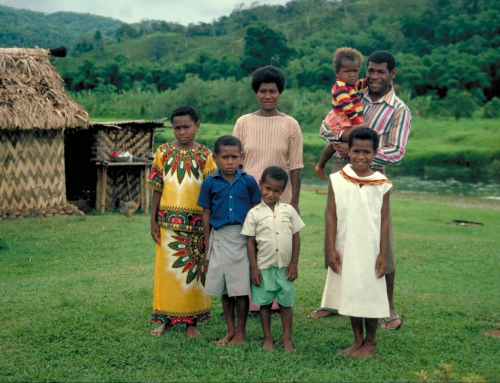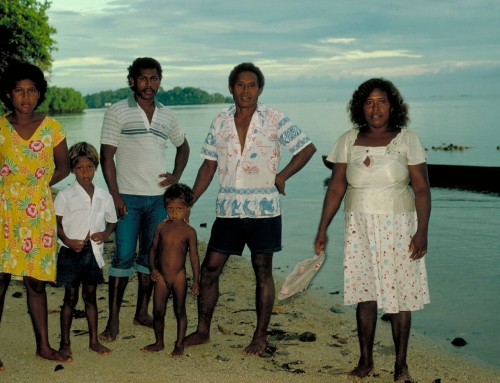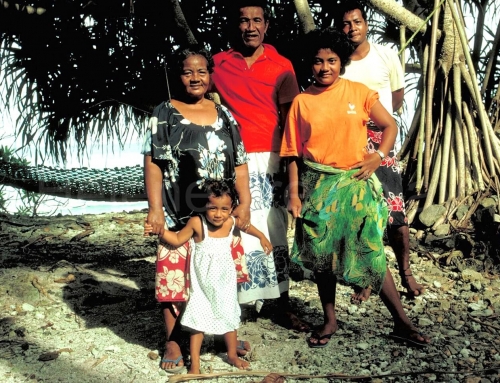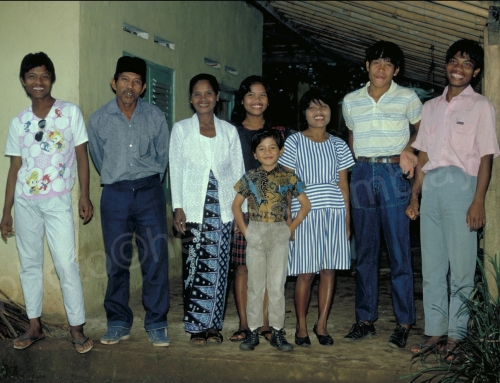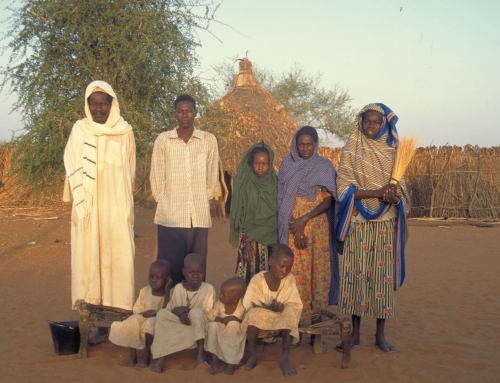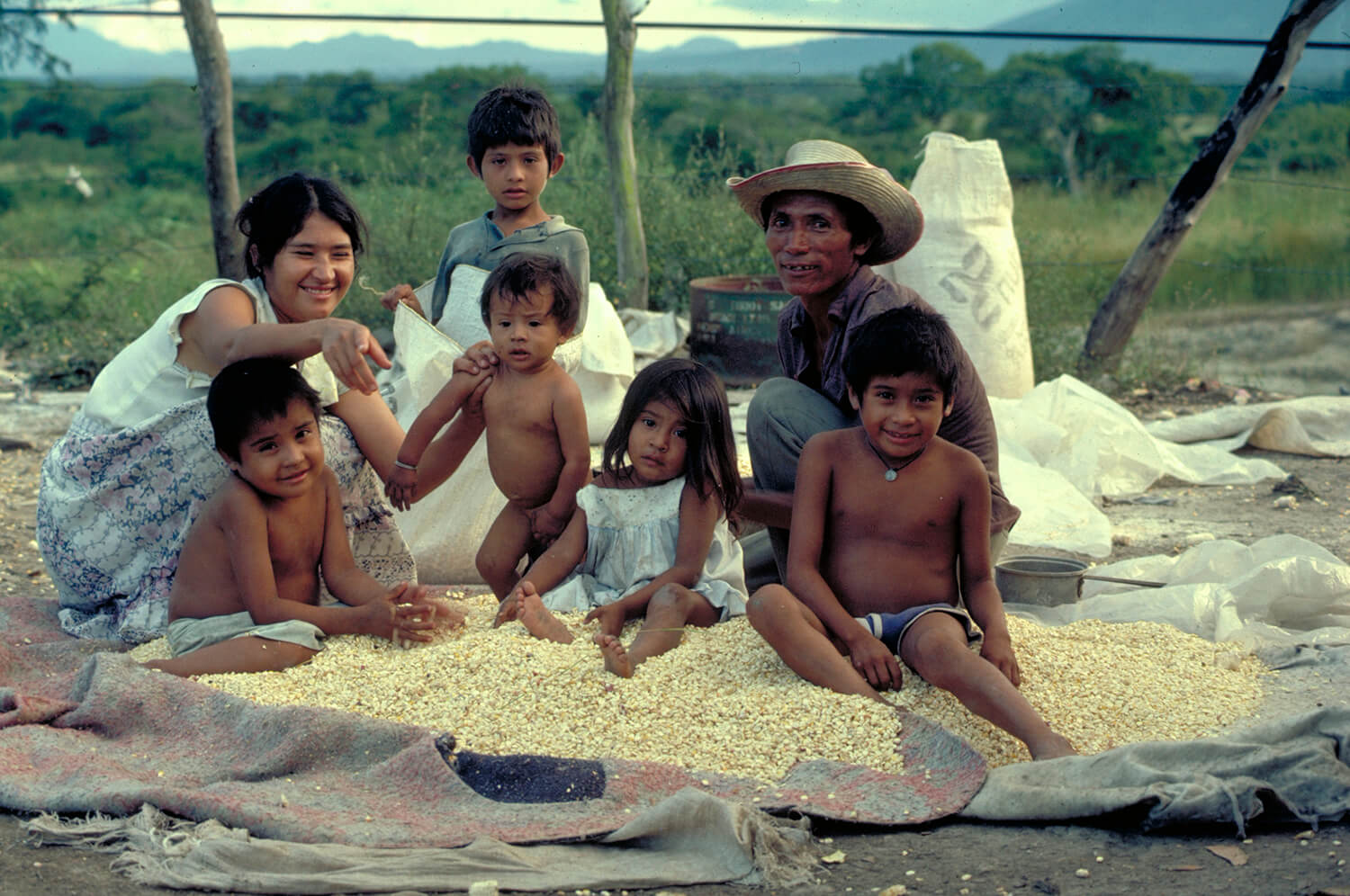
THE GIRON RAMIREZ FAMILY
Majim Ramirez, age 45 (1)
Emilia Giron, 24 (2)
Juan Gilberta Giron, 10 (3)
Jose Santos, 8 (4)
Pablo, 6 (5)
Martha Esperanza Bartita, 4 (6)
Jose Wilfreoo Ramirez Giron (Willy), 8 months (7)
1 dog and her 5 puppies
1 cat
10 chickens
3 ducks
Grupo Pajonal,
Comayagua
November 4 , 1984
Morning comes early with Mother’s conversations
Emilia gets up in the dark, patters across the dirt floor of her one-room house, and lights the fire for the morning coffee. The fact that her family is still sleeping just a few feet away does not stop her from speaking aloud. She converses with herself, running through the chores for the day, while her ten-year-old son, Juan, lying closest to her on an old car seat with broken springs, murmurs as if in response. Morning comes early with Mother’s conversations. Just as she places the pot on the fire, eight-month-old Willy wakes up crying. Emilia puts him to her breast, and nudging Juan aside, sits down on the old car seat. Her husband, Majim, will serve the coffee.
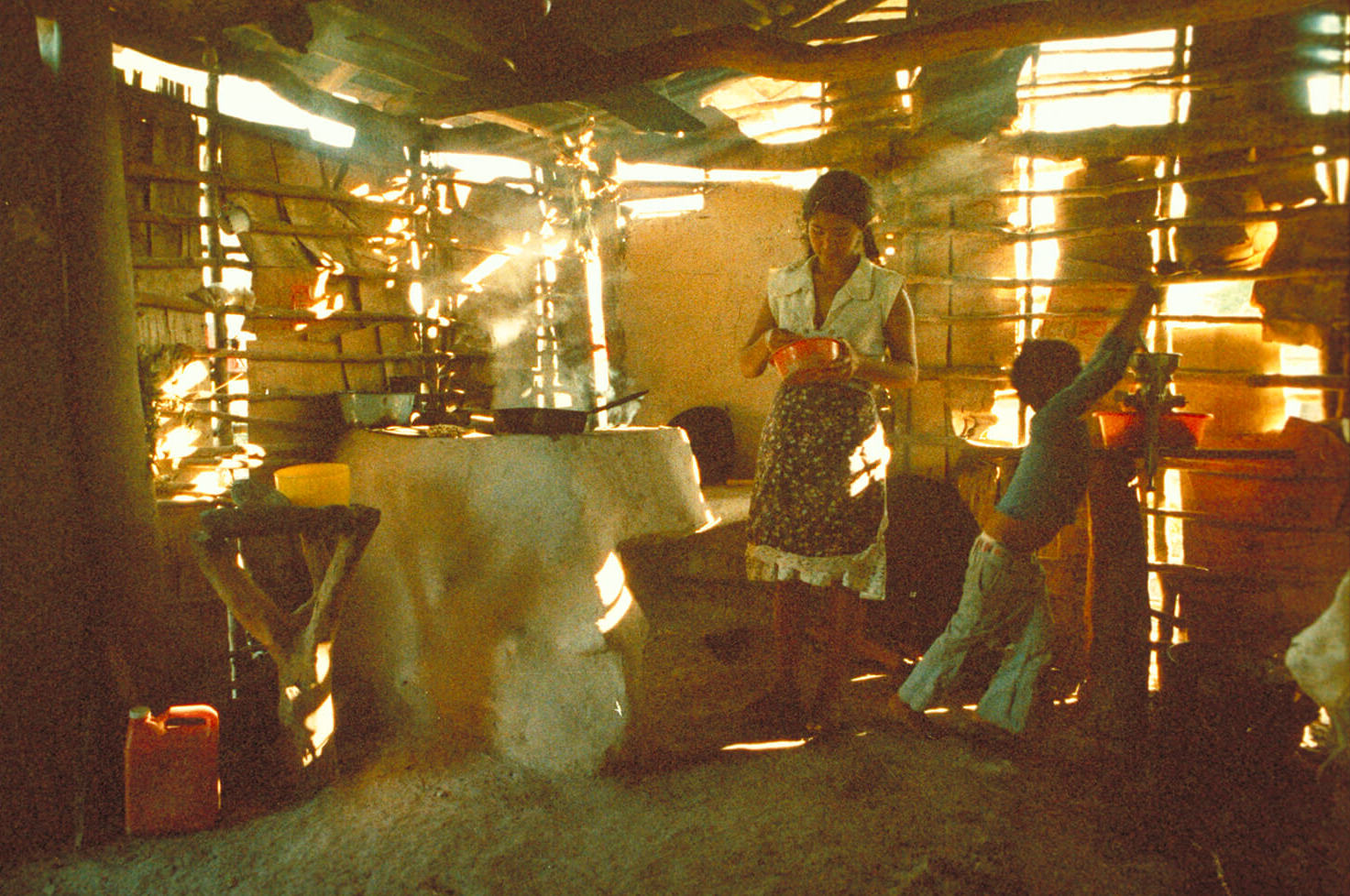
The announcement of a plot against the President
Majim turns on the radio, but the batteries are so low that the announcement of a plot against the President of the Republic is barely audible. Nobody pays attention anyway. The life and daily concerns of the poor farmers in Honduras are so far removed geographically and politically from the seat of the government that it’s almost like listening to news from another country. Just as the reporter begins to speak of Indira Gandhi’s assassination in India, Majim turns off the radio.
“It takes a long time,” he was told in the town
Before it gets too hot, Juan and his younger brother Jose set off for their first trip to the river, pulling a homemade cart loaded with a dozen plastic jerry cans. It is a half-hour walk to the river, and it will take three trips to fetch enough water to last the day. Majim goes out into his field to pick com for the children to strip so that he can sell it in the Comayagua market on Sunday. Four years ago, Majim left the arid country of the Tibuca region for Comayagua. He was able to take advantage of a short-lived agrarian reform and, along with forty other families, was granted four manzanas (seven acres) of barely arable land. He is still waiting, without making too much fuss, for the papers that confirm his title. “It takes a long time,” he was told in the town.
8:00. Once the men have left for work, Emilia can relax in her tiny kitchen. She prepares a breakfast of tortillas and beans, watched avidly by the emaciated dog, who lies passively feeding her puppies.
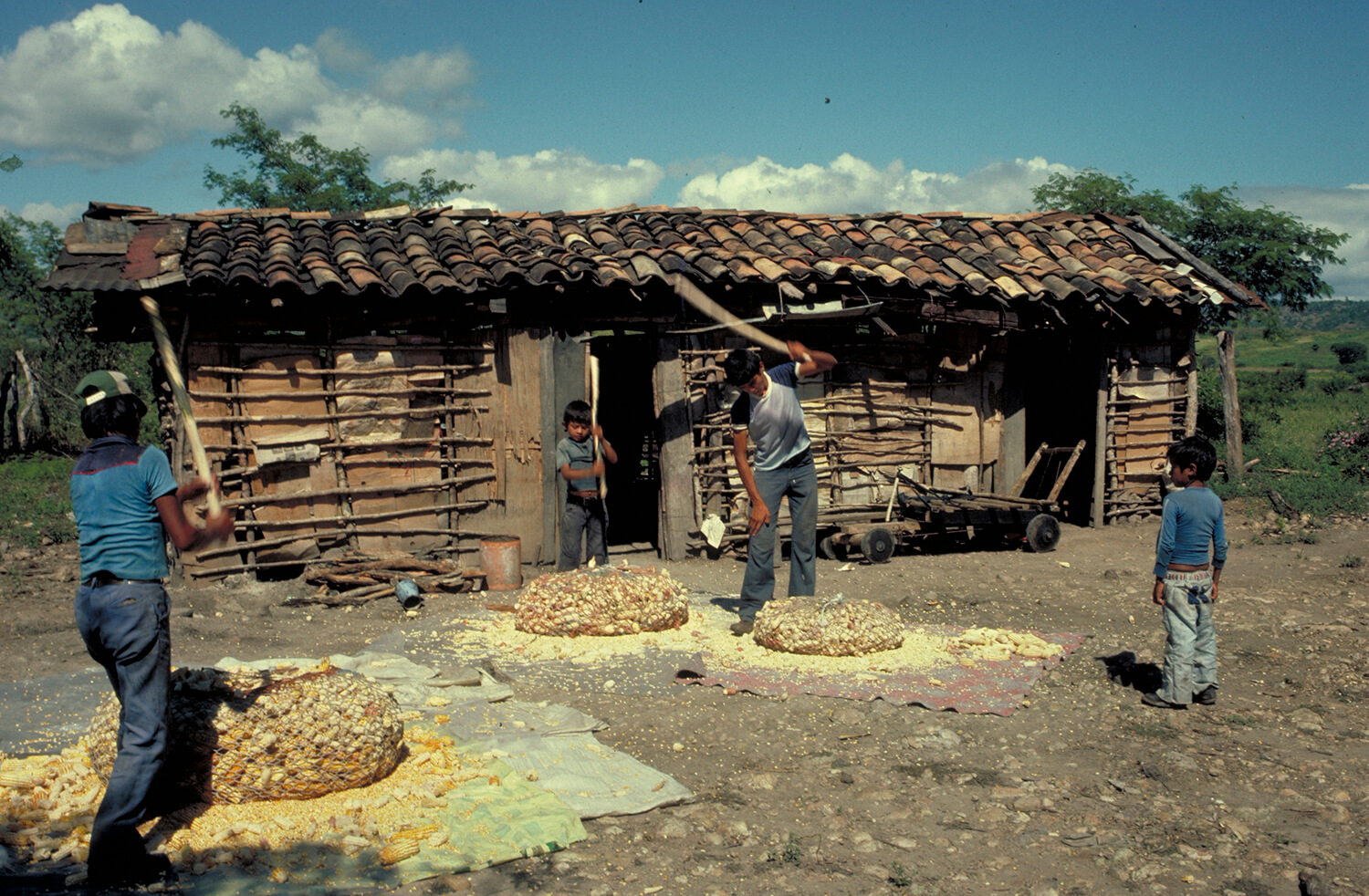
The boys wrap the dried ears of corn in netting and place them on large plastic sheets. Then they beat them with sticks. They put the shelled com in bags to sell in the city It takes all of Jose’s strength to mash the cooked com. Then Emilia will roll the dough on the fiat stone to make tortillas
Majim, a widower, was immediately smitten…
Emilia’s first husband was killed in a settling of accounts. Left on her own, with four children, she went from the countryside to the city to work as a maid. Juan, who was then seven years old, left school to look after his brothers and sister while his mother was away. One day Emilia came to the Comayagua area to harvest tomatoes. There she met Majim, a widower, who was immediately smitten and asked her to move in with him. Little Willy came along soon after, and Juan was finally able to start elementary school.
9:30. Majim returns from the fields. By now the boys have been to the river and back twice. Everyone takes refuge from the heat in the coolness of the house. When he met Emilia, Majim lived at his mother’s house with his young daughter. Leaving his daughter with her grandmother, he moved his new family into a cardboard shack until he could save enough money to build a real house with a tiled roof. The roof is now finished, but the house walls are still just interwoven branches tightly knotted together and the gaps need to be filled in with mud. Soon they will have to have proper shelter. At night the wind blows through the walls, and the children often have colds. Emilia pesters Majim to finish the house. He promises to do so as soon as he has sold the corn, harvested the frijoles, and picked the watermelons. But in all likelihood he will not be able to make the hundreds of trips to the river that would be needed to mix the mud.
The whole family has breakfast. Emilia eats hers with Willy at her breast. With practiced hands the children hungrily scoop up the beans with their tortillas. Between harvests Emilia often runs out of beans and has only tortillas for her children.
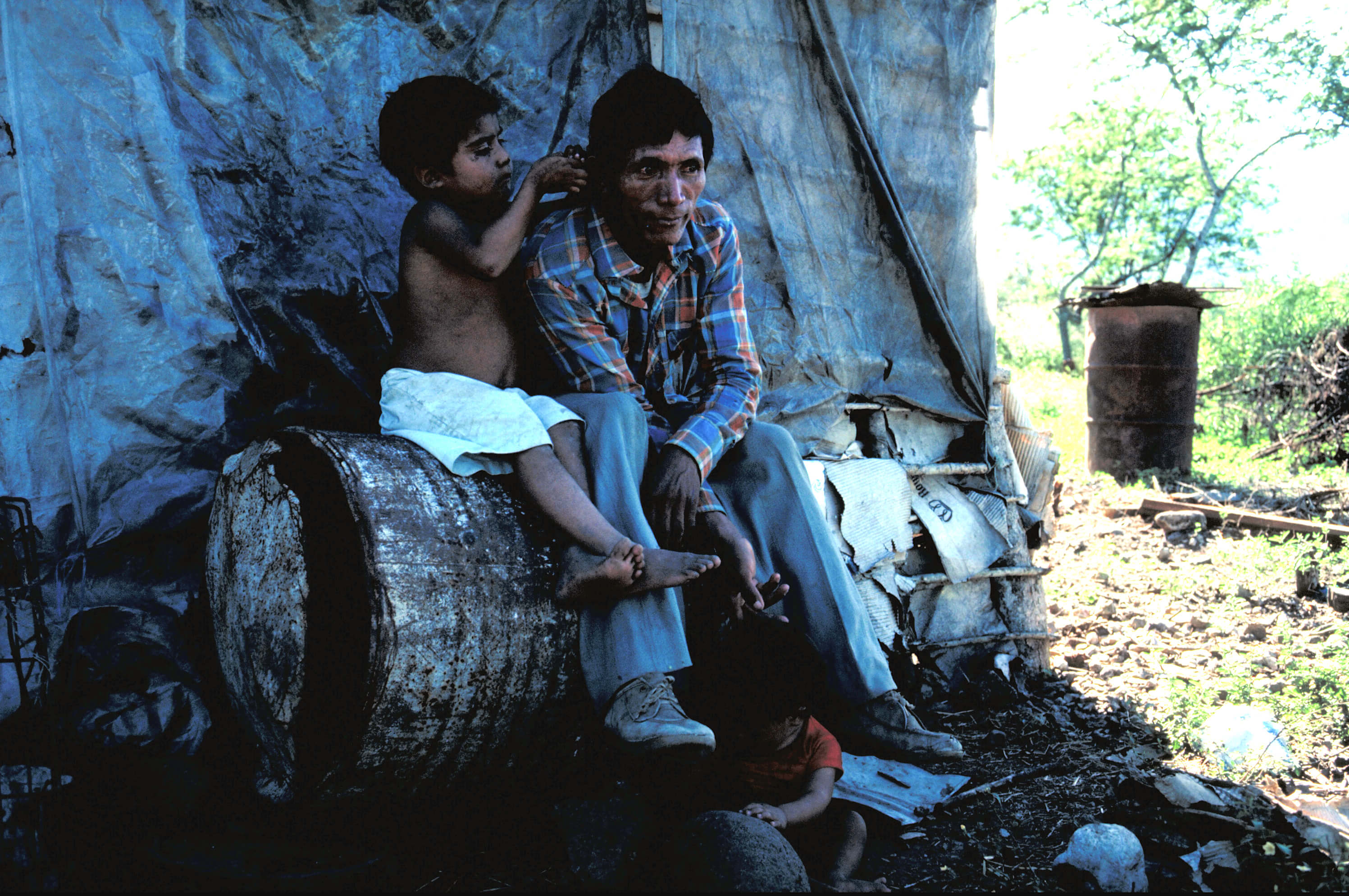
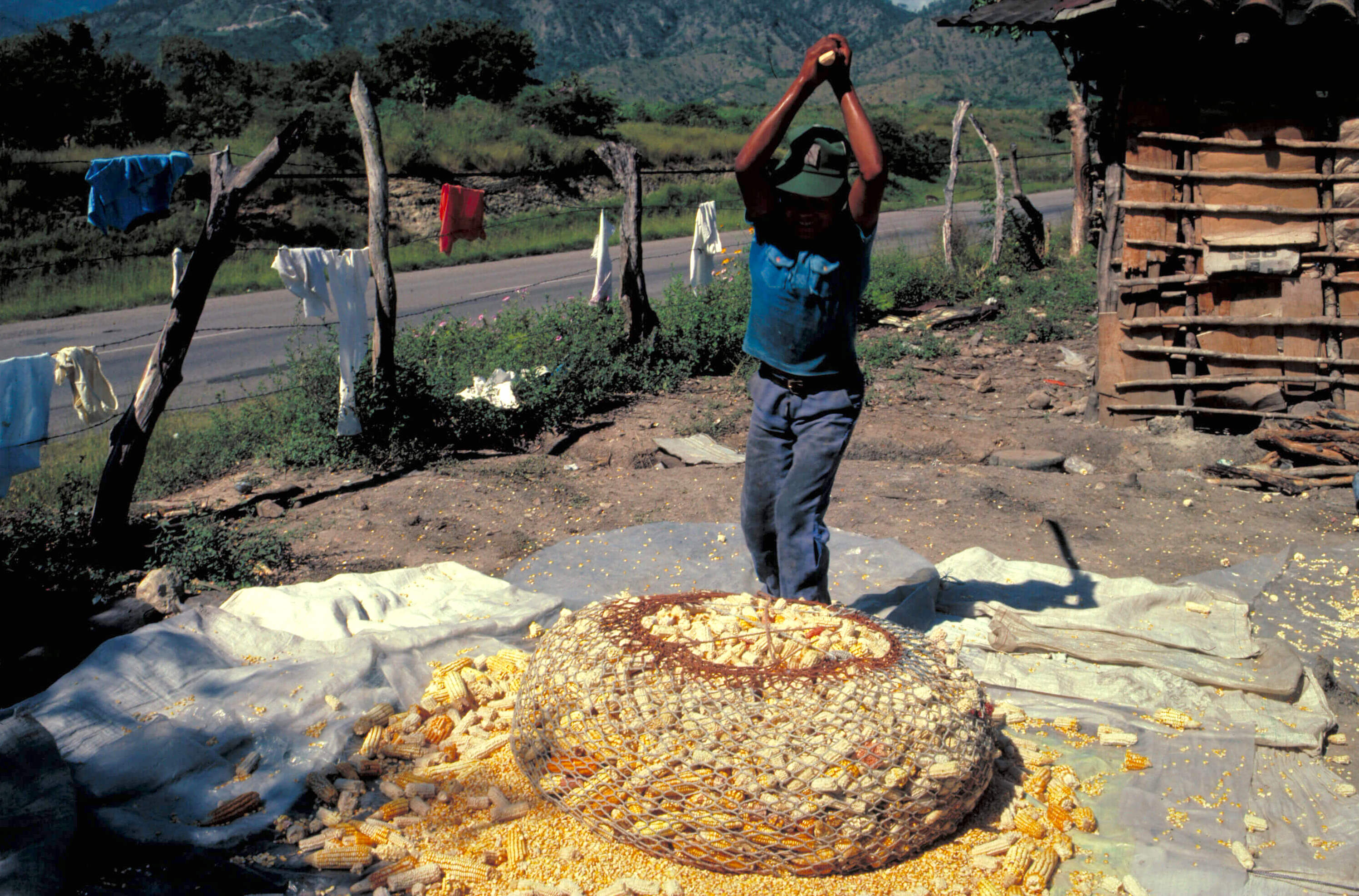
Emilia pesters Majim to finish the house
9:30. Majim returns from the fields. By now the boys have been to the river and back twice. Everyone takes refuge from the heat in the coolness of the house. When he met Emilia, Majim lived at his mother’s house with his young daughter. Leaving his daughter with her grandmother, he moved his new family into a cardboard shack until he could save enough money to build a real house with a tiled roof. The roof is now finished, but the house walls are still just interwoven branches tightly knotted together and the gaps need to be filled in with mud. Soon they will have to have proper shelter. At night the wind blows through the walls, and the children often have colds. Emilia pesters Majim to finish the house. He promises to do so as soon as he has sold the corn, harvested the frijoles, and picked the watermelons. But in all likelihood he will not be able to make the hundreds of trips to the river that would be needed to mix the mud.
The whole family has breakfast. Emilia eats hers with Willy at her breast. With practiced hands the children hungrily scoop up the beans with their tortillas. Between harvests Emilia often runs out of beans and has only tortillas for her children.
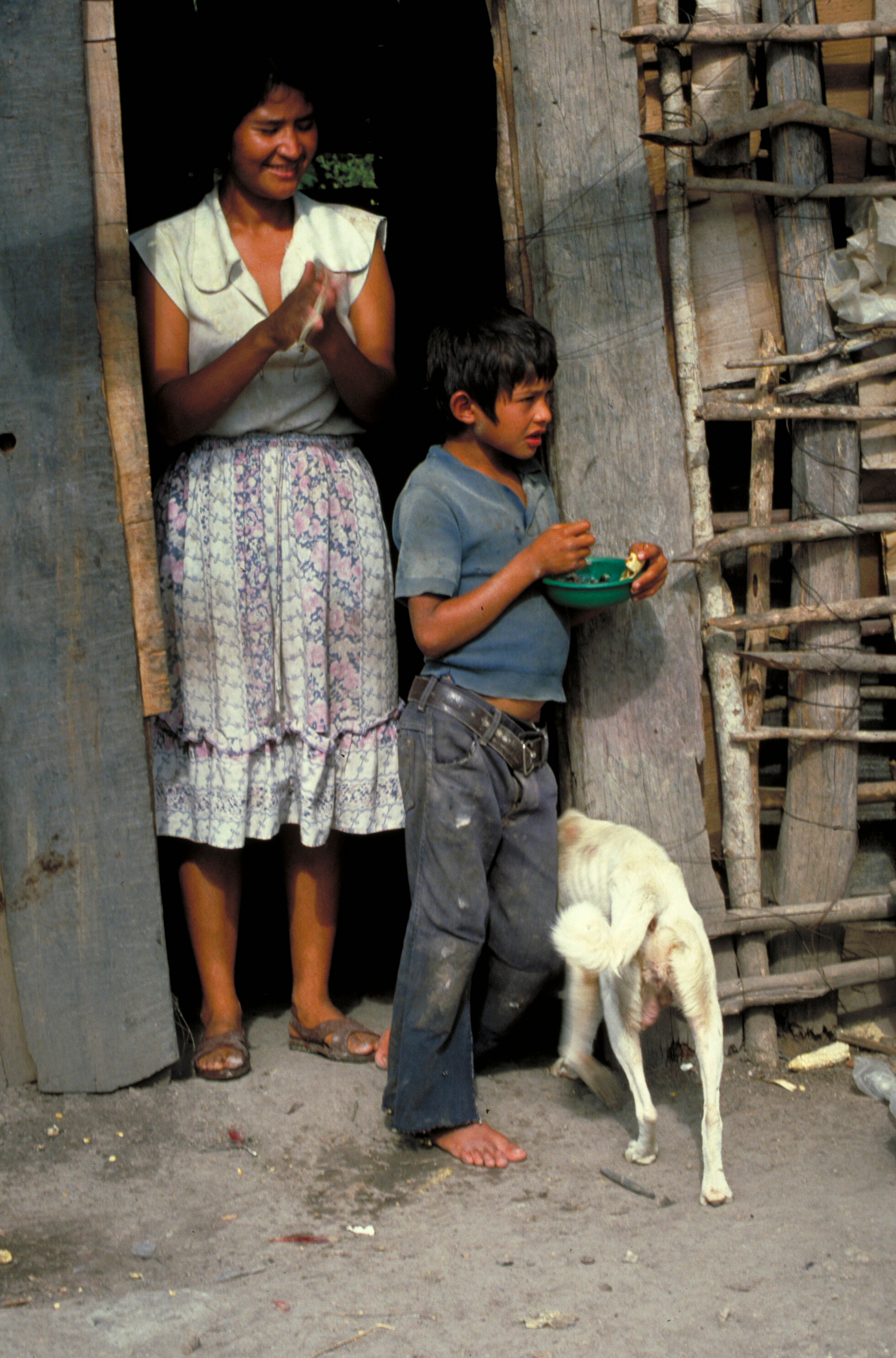
Emilia is always cheerfully compliant.
10:30. Majim picks up his wheelbarrow and goes off to pick more corn. Juan and Jose make their last trip to the river. In an hour it will be too hot to do anything until the afternoon. Willy does not want to leave his mother’s breast, and Emilia is always cheerfully compliant. Pablo and Martha have nothing much to play with. They amuse themselves by watching the chickens. When a hen lays an egg on the bed, they grab it and shove it into a cardboard box. The chickens and the ducks are very thin. From time to time, Emilia picks them up, weighs them in her hand, and decides against making a meal out of them for her family. Today’ s lunch will be the same as every other meal: beans and tortillas.
2:30. Siesta is over. At last the sun has moved behind the house, and the family can tend to their afternoon chores. Emilia gathers some dead twigs to fashion into a broom and sweeps the yard.
He will wait until the children get big enough to help him in the fields.
Majim sits in the shade and watches his stepsons shell the corn. First the children wrap the dried ears in netting and place them on large plastic sheets. Then they beat the bundles with heavy sticks to loosen the kernels. Majim wonders how many sacks they will be able to fill. He could produce more if he worked all his land instead of only half. He would like to go ahead, but he cannot afford a plow animal and he does not have enough energy to do the extra plowing himself. He will wait until the children get big enough to help him in the fields. Pablo takes advantage of his stepfather’s inactivity to hunt for lice in his hair.
Peasant Women
3:00. Today at Emilia’s neighbor’s house the women of the community are meeting with the representative of the Honduran Federation of Peasant Women. The Federation has donated six pigs for the mothers to raise and sell. One is already sick and the others are not getting enough food. The representative tells the women that the pigs have to be well fed in order to be sold and recommends using leftovers. “But what leftovers?” Emilia asks. “Our kitchens are bare.” The representative, whose parents are peasants too, looks flustered. “Perhaps you could grow some food,” she says. “Perhaps,” replies Emilia kindly. “But who will look after our children and give us tools and seeds? Can the Federation help us?” The representative leaves, promising to discuss these unforeseen problems with her organization’s leaders.
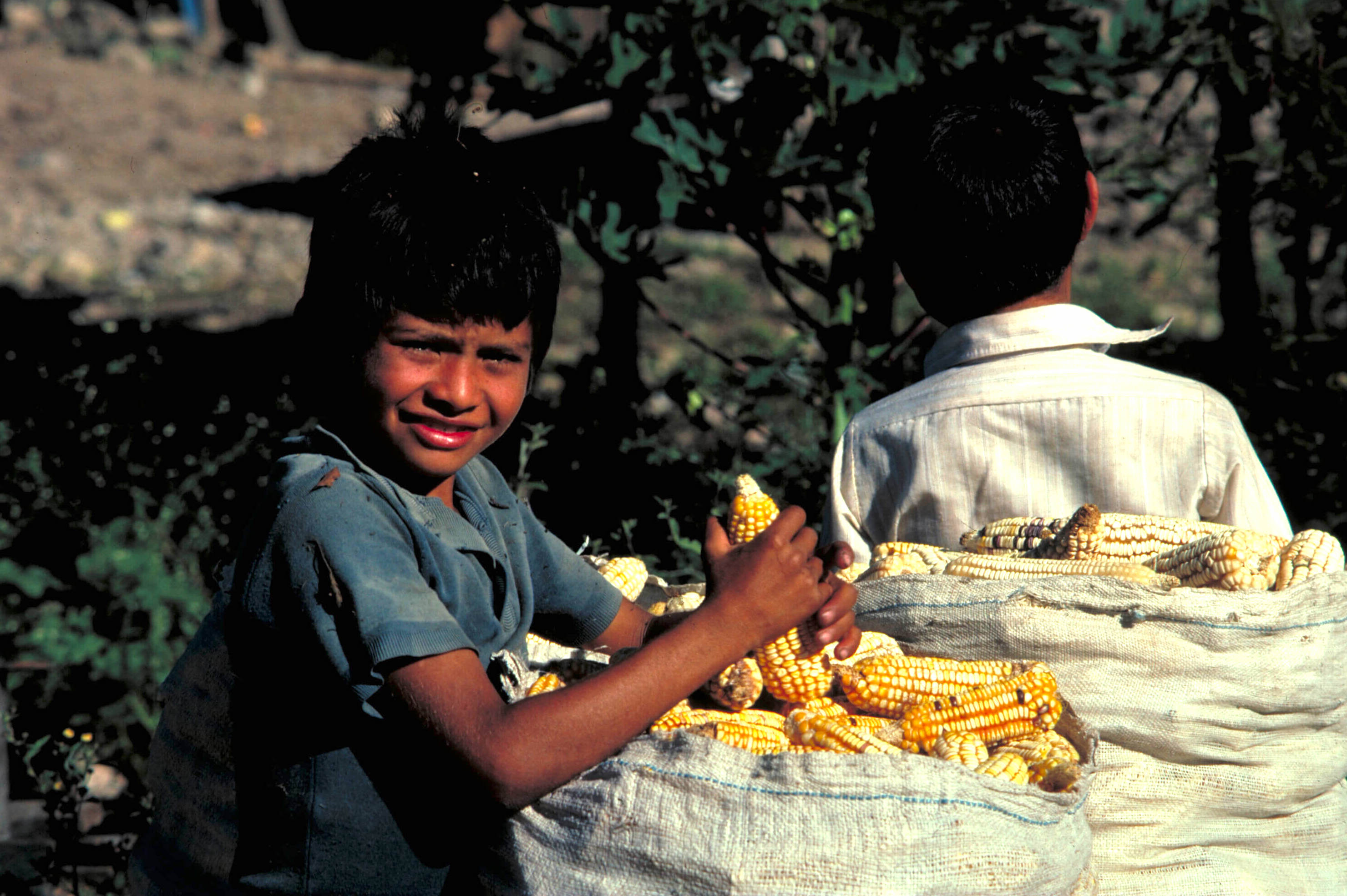
Playing football in the moonlit field
Emilia returns in the late afternoon. The heat is even more unbearable. With Willy at her breast, and Pablo and Martha clutching her skirts, Emilia goes to the river to wash some clothes and cool off in the cold water under the bridge.
6:00. The sun has set behind the mountains and the full moon is on the rise. After their beans, the men go to play football in the moonlit field while the women visit from shack to shack with their babies on their arms. All over the world, in places where there is no electricity, families take advantage of this extension of natural light.
7:30. Full moon or not, it’s bedtime for the smallest children. Emilia lights the house by placing a burning wooden stick from the fire in the middle of the dirt floor. She lifts Pablo into the hammock which hangs over the two beds and covers Martha, who always protests at this point. As for Willy, he is already asleep in his parents’ bed, his fists tightly clenched.
9:00. Juan returns to the uncomfortable car seat and quickly falls asleep, oblivious for now to his mother’s voice, which can be heard as she lies in bed telling her husband about the afternoon’s meeting. As they drift off to sleep, Martha begins to cry. Her life has been tough since Willy was born. She had to give up her place in her parents’ bed and go and sleep with Jose. She can’t snuggle up to her brother they way she could to her mother. “I have to go,” wails Martha. “Get up, go, and get back into bed,” says her mother from the next bed. Sniffing, Martha gets up, squats on the dirt floor at the end of her bed, and lies down again. Her crying has awakened Willy, who needs only to nuzzle at his mother’s breast to fall back to sleep.

